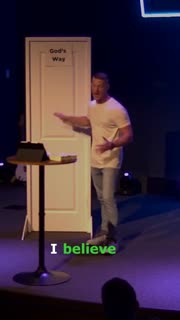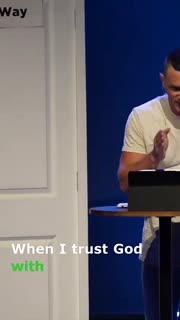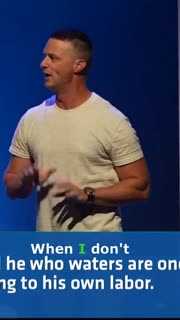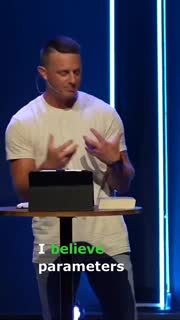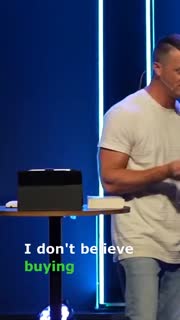Living with Margin: Embracing God's Financial Principles
Devotional
Sermon Summary
Bible Study Guide
Sermon Clips
### Quotes for Outreach
1. "We got to choose are we going to walk in in God's way are we going to walk through God's door are we going to walk this the way the Bible teaches and the way that God lays it out for us to do whatever it is, life, money, parenting, marriage, whatever. Am I going to do this God's way or am I going to do this my way? Are we going to do this our way?" (24 seconds)
2. "What if I were to come up here today and I were to say, if you will take and apply this, your marriage will get better. You'll be a better parent. You'll be a better follower of Jesus. Your life will be less stressful. Come on, anybody with me on that? Y'all acting real holy up in the room today. You know, your life will be less stressful. You'll be a better friend. What if I were to tell you you'll be a better co-worker, right? It won't be as bad in life because let's be real, life, life's sometimes. And it gets hard. But what if when those moments come, I don't have to be as stressed. I don't have to be as anxious." (39 seconds)
3. "I believe that margin actually shows obedience. It allows for obedience. I believe that margin actually creates a greater opportunity for me to partner with God to make a bigger difference than I can make by myself. In fact, I believe that everybody has this innate desire deep down on the inside of them to be a part of something bigger than ourselves." (24 seconds)
4. "When I trust God with outcomes, I'm not trying to force anything. I'm just trying to do the best I can with what I have. And I just go, You know what, God? And hear me. Stewardship doesn't matter about the amount. You got to hear that. Proper stewardship doesn't start whenever you make $10,000 every two weeks. Proper stewardship starts whenever you're getting... Because stewardship is management. It means I'm a manager of something that's not mine." (34 seconds)
5. "I think God does want us to have fun, but what are we doing with what he's given us? So we have to trust God radically. I've got to keep going. Number two, I think the second thing we can do to create margin in our finances is we trust God radically and we budget consistently. Budget consistently." (20 seconds)
### Quotes for Members
1. "I don't believe that it's a problem of wanting to be generous. I don't believe it's a problem of wanting to give. I don't believe it's a problem of want. I think it's a problem of can't. For many of us, it's so stretched. It's so stressful. It's so frustrating. Here, Chris, do something with those. Hand them behind you. I don't know. I just realized I didn't put them back in the box. What happens is our margin is completely taken up by, what if I were to tell you, by things that we didn't have to have?" (43 seconds)
2. "What if I didn't live my life to such the edges that when I went home, my kids actually got something from their dad? What if I didn't live my life to such the edges for everybody else that my wife has to suffer because everybody else got what she deserved? Come on, y'all. What if I didn't live with financial financially to the edges so much that when God needs or God asks, I've got? That when the local, you know what I'm saying? Like, tithe doesn't have to be an option because now I've created margin." (37 seconds)
3. "When I don't trust God radically, I have to create the outcomes. And I will stress myself. And I will stress everybody around me. And I will live to the edges. And I will run hard. And I will go tough. And I will do all these things. All in the name of outcome. I know what I need to accomplish. I know where I need to go. I know what I need to do. And so therefore, I've got to create the outcome. But when I trust God, my job is to plant the seed and water the seed. I can't do a thing to create the growth." (39 seconds)
4. "I believe parameters are better than not having parameters. In fact, parameters are biblically freedom. It's God going, here's the parameters of the life with me. It's not God limiting your life. It's God giving you life. He's going, you don't have to worry about all the other areas. Live within these parameters. In finances, budgeting is doing the same thing." (25 seconds)
5. "I don't believe buying things is bad. I believe buying things you can't afford is. And that means that I need to put off what I want now for what I need most. Are you with me? I've got to create that margin. Because just like Boaz, he had this field. And Naomi and Ruth were in need, and they knew where they could go to get what they needed. What if you and I created so much margin, we budgeted consistently, we trusted God radically, we spent so wisely, that we know, that people know I can go to them for love and prayer." (44 seconds)
Ask a question about this sermon
1. "We got to choose are we going to walk in in God's way are we going to walk through God's door are we going to walk this the way the Bible teaches and the way that God lays it out for us to do whatever it is, life, money, parenting, marriage, whatever. Am I going to do this God's way or am I going to do this my way? Are we going to do this our way?" (24 seconds)
2. "What if I were to come up here today and I were to say, if you will take and apply this, your marriage will get better. You'll be a better parent. You'll be a better follower of Jesus. Your life will be less stressful. Come on, anybody with me on that? Y'all acting real holy up in the room today. You know, your life will be less stressful. You'll be a better friend. What if I were to tell you you'll be a better co-worker, right? It won't be as bad in life because let's be real, life, life's sometimes. And it gets hard. But what if when those moments come, I don't have to be as stressed. I don't have to be as anxious." (39 seconds)
3. "I believe that margin actually shows obedience. It allows for obedience. I believe that margin actually creates a greater opportunity for me to partner with God to make a bigger difference than I can make by myself. In fact, I believe that everybody has this innate desire deep down on the inside of them to be a part of something bigger than ourselves." (24 seconds)
4. "When I trust God with outcomes, I'm not trying to force anything. I'm just trying to do the best I can with what I have. And I just go, You know what, God? And hear me. Stewardship doesn't matter about the amount. You got to hear that. Proper stewardship doesn't start whenever you make $10,000 every two weeks. Proper stewardship starts whenever you're getting... Because stewardship is management. It means I'm a manager of something that's not mine." (34 seconds)
5. "I think God does want us to have fun, but what are we doing with what he's given us? So we have to trust God radically. I've got to keep going. Number two, I think the second thing we can do to create margin in our finances is we trust God radically and we budget consistently. Budget consistently." (20 seconds)
### Quotes for Members
1. "I don't believe that it's a problem of wanting to be generous. I don't believe it's a problem of wanting to give. I don't believe it's a problem of want. I think it's a problem of can't. For many of us, it's so stretched. It's so stressful. It's so frustrating. Here, Chris, do something with those. Hand them behind you. I don't know. I just realized I didn't put them back in the box. What happens is our margin is completely taken up by, what if I were to tell you, by things that we didn't have to have?" (43 seconds)
2. "What if I didn't live my life to such the edges that when I went home, my kids actually got something from their dad? What if I didn't live my life to such the edges for everybody else that my wife has to suffer because everybody else got what she deserved? Come on, y'all. What if I didn't live with financial financially to the edges so much that when God needs or God asks, I've got? That when the local, you know what I'm saying? Like, tithe doesn't have to be an option because now I've created margin." (37 seconds)
3. "When I don't trust God radically, I have to create the outcomes. And I will stress myself. And I will stress everybody around me. And I will live to the edges. And I will run hard. And I will go tough. And I will do all these things. All in the name of outcome. I know what I need to accomplish. I know where I need to go. I know what I need to do. And so therefore, I've got to create the outcome. But when I trust God, my job is to plant the seed and water the seed. I can't do a thing to create the growth." (39 seconds)
4. "I believe parameters are better than not having parameters. In fact, parameters are biblically freedom. It's God going, here's the parameters of the life with me. It's not God limiting your life. It's God giving you life. He's going, you don't have to worry about all the other areas. Live within these parameters. In finances, budgeting is doing the same thing." (25 seconds)
5. "I don't believe buying things is bad. I believe buying things you can't afford is. And that means that I need to put off what I want now for what I need most. Are you with me? I've got to create that margin. Because just like Boaz, he had this field. And Naomi and Ruth were in need, and they knew where they could go to get what they needed. What if you and I created so much margin, we budgeted consistently, we trusted God radically, we spent so wisely, that we know, that people know I can go to them for love and prayer." (44 seconds)


